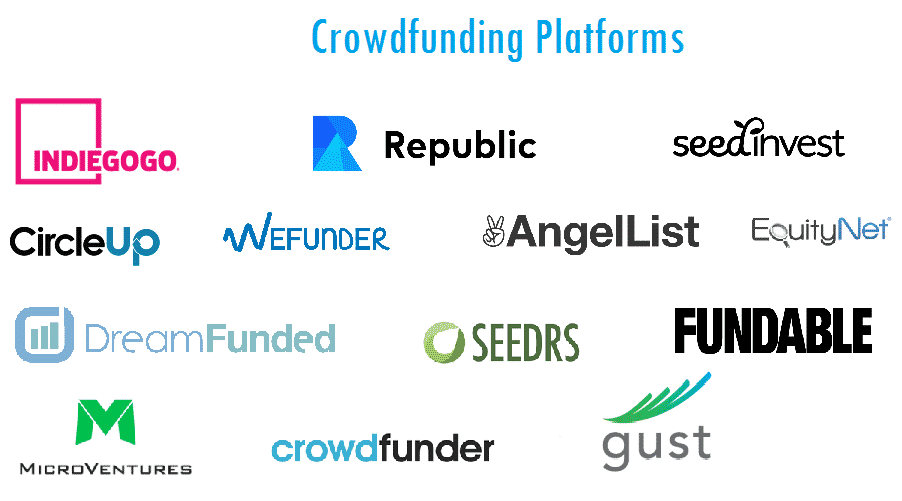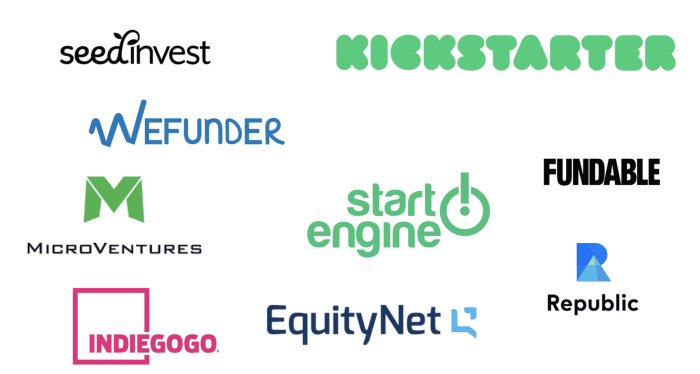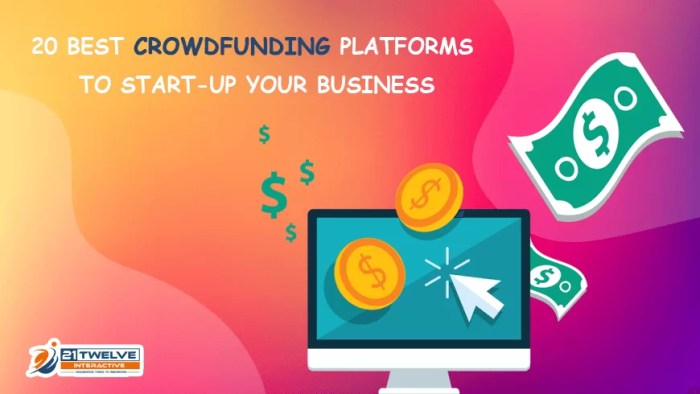
Delving into Crowdfunding platforms for startups, this introduction immerses readers in a unique and compelling narrative, with a focus on how startups can thrive in the crowdfunding landscape.
Exploring the ins and outs of crowdfunding platforms, this guide sheds light on the opportunities and challenges that startups face in raising funds through innovative means.
Crowdfunding Platforms for Startups

Crowdfunding is a method of raising capital through the collective effort of friends, family, customers, and individual investors. It allows startups to showcase their business ideas to a wider audience and secure funding from various sources.
Popular Crowdfunding Platforms for Startups
- Kickstarter: Known for creative projects and products, Kickstarter is a popular choice for startups looking to fund their innovative ideas.
- Indiegogo: Offers flexible funding options, allowing startups to keep the funds raised even if the campaign does not reach its goal.
- SeedInvest: Focuses on equity crowdfunding, connecting startups with accredited investors to raise capital in exchange for equity in the company.
- Crowdcube: Specializes in equity crowdfunding for startups in the UK and Europe, providing opportunities for investors to become shareholders in promising businesses.
Advantages and Disadvantages of Using Crowdfunding Platforms for Startup Funding
Using crowdfunding platforms for startup funding has its own set of advantages and disadvantages:
- Advantages:
- Access to a larger pool of potential investors who are interested in supporting innovative ideas.
- Opportunity to validate the market demand for the product or service through pre-orders and pledges.
- Potential for increased brand visibility and marketing exposure as the campaign gains traction online.
- Disadvantages:
- Risk of not reaching the funding goal and not receiving any capital if the campaign falls short.
- Platform fees and charges associated with running a crowdfunding campaign can eat into the funds raised.
- Potential for intellectual property theft or idea replication by competitors who have access to the campaign details.
Types of Crowdfunding Models

Crowdfunding for startups can take various forms, each with its own set of pros and cons. Understanding the different crowdfunding models available is crucial for startups looking to raise funds effectively.
Reward-Based Crowdfunding
Reward-based crowdfunding involves offering backers a reward in exchange for their financial support. This could be a product sample, exclusive access, or a personalized experience.
- Pros:
- Allows startups to validate their product or service idea through pre-sales.
- Builds a community of loyal customers and brand advocates.
- Cons:
- Requires fulfilling rewards, which can be time-consuming and costly.
- May not attract investors looking for equity.
Donation-Based Crowdfunding
Donation-based crowdfunding involves raising funds through donations from individuals who support the cause or mission of the startup.
- Pros:
- Allows startups to raise funds without giving away equity.
- Appeals to supporters who believe in the startup’s vision.
- Cons:
- Relies heavily on the goodwill of donors.
- May not be sustainable for long-term fundraising.
Equity Crowdfunding
Equity crowdfunding involves selling shares of the startup to a large number of investors through an online platform.
- Pros:
- Allows startups to raise significant capital without taking on debt.
- Opens up the opportunity to attract professional investors.
- Cons:
- Requires startups to give up a portion of ownership and control.
- Comes with legal and regulatory complexities.
Creating a Compelling Crowdfunding Campaign
To launch a successful crowdfunding campaign for your startup, it is crucial to include essential elements that will attract backers and help you reach your funding goals. Here, we will discuss the key components of a compelling crowdfunding campaign, strategies for setting realistic funding goals, and tips for effective marketing to attract backers.
Essential Elements of a Successful Crowdfunding Campaign
- Clear and compelling story: Craft a compelling narrative that explains your startup, its mission, and the problem it aims to solve. Make sure to connect with your audience emotionally.
- Engaging video and visuals: Create a high-quality video that showcases your product or service in action. Visuals play a crucial role in capturing the attention of potential backers.
- Transparent budget breakdown: Be transparent about how you plan to use the funds raised. Provide a detailed budget breakdown to build trust with your backers.
- Attractive rewards: Offer attractive rewards to incentivize backers to support your campaign. Make sure the rewards are unique and valuable to your target audience.
- Regular updates: Keep your backers informed about the progress of your campaign. Regular updates help build trust and keep backers engaged throughout the campaign.
Setting Realistic Funding Goals
- Evaluate your funding needs: Calculate the exact amount of funds you need to bring your startup to the next level. Consider all expenses, including manufacturing, marketing, and operational costs.
- Research similar campaigns: Study successful crowdfunding campaigns in your industry to understand funding trends and set realistic goals based on their outcomes.
- Factor in fees and contingencies: Account for platform fees, payment processing fees, and unexpected expenses when setting your funding goal. It’s essential to have a buffer for contingencies.
- Communicate your goals: Clearly communicate your funding goals and how the funds will be utilized in your campaign. Transparency is key to gaining the trust of backers.
Marketing Your Crowdfunding Campaign
- Utilize social media: Leverage social media platforms to promote your campaign and reach a wider audience. Engage with potential backers and share compelling content to generate interest.
- Collaborate with influencers: Partner with influencers or industry experts who can help promote your campaign to their followers. Their endorsement can significantly boost your campaign’s visibility.
- Email marketing: Build an email list of potential backers and send targeted campaigns to keep them informed about your progress. Personalized emails can help convert leads into backers.
- Engage with the community: Engage with your target audience on forums, community groups, and other online platforms to generate buzz around your campaign. Building a strong community can lead to organic support.
Startup Funding

Startup funding refers to the financial resources that new businesses need to launch, grow, and succeed in the market. Securing adequate funding is crucial for startups as it enables them to cover initial costs, develop products or services, hire skilled employees, and scale their operations effectively.
Comparison of Traditional Funding Sources and Crowdfunding Platforms
Traditional funding sources such as venture capital and angel investors have been the go-to options for startups seeking financial support. These sources typically involve high capital requirements, strict eligibility criteria, and a lengthy approval process. On the other hand, crowdfunding platforms offer a more accessible and democratic approach to fundraising. Startups can pitch their ideas to a large pool of potential investors or backers, who can contribute small amounts of money to support the project.
This allows startups to raise funds quickly, test market demand, and build a community of loyal customers and supporters.
- Venture Capital and Angel Investors:
- High capital requirements
- Stringent eligibility criteria
- Long approval process
- Crowdfunding Platforms:
- Accessible and democratic
- Quick fundraising
- Market demand testing
Challenges Faced by Startups and How Crowdfunding Can Help
Startups often face challenges when seeking funding, such as limited access to traditional financing options, lack of a proven track record, and fierce competition in the market. Crowdfunding can help startups overcome these challenges by providing a platform to showcase their ideas, attract early adopters, and validate their business concepts. Additionally, crowdfunding allows startups to build a community of engaged supporters who can provide valuable feedback, share the campaign with their networks, and help create buzz around the product or service.
- Limited Access to Traditional Financing:
- Crowdfunding offers an alternative funding source
- Allows startups to reach a broader audience
- Lack of a Proven Track Record:
- Crowdfunding enables startups to establish credibility
- Backers can support innovative ideas and early-stage ventures
- Market Competition:
- Crowdfunding helps startups differentiate themselves
- Provides a platform to showcase unique value propositions
In conclusion, navigating the world of crowdfunding platforms for startups requires strategic planning, creativity, and a deep understanding of the market. By harnessing the power of crowdfunding, startups can catapult their ideas into successful ventures that resonate with backers worldwide.
Query Resolution
What are some key benefits of using crowdfunding platforms for startups?
Using crowdfunding platforms can provide startups with access to a large pool of potential investors, increased visibility, and validation of their ideas from the market.
How can startups effectively market their crowdfunding campaigns?
Startups can leverage social media, engage with influencers, create compelling storytelling content, and offer attractive rewards to attract backers to their crowdfunding campaigns.
What are the main differences between traditional funding sources and crowdfunding platforms for startups?
Traditional funding sources like venture capital and angel investors involve equity stakes and established networks, while crowdfunding platforms allow startups to raise funds from a diverse group of backers without giving up ownership.





